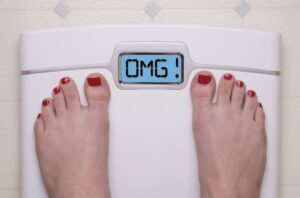Weight Loss Tips for Women Over 40: Simple Habits That Actually Work
Losing weight can feel frustrating—especially after 40. That’s why I put together these weight loss tips for women over 40 to help you lose weight naturally and feel like yourself again. You don’t need a perfect plan—just the right habits done consistently.
Eat Clean Whole Food
One of the most important things you can do is to eat a healthy diet. Fill your plate with lots of fruits, vegetables, lean meats, and whole, gluten-free grains (if you tolerate them). These foods give you the nutrients you need without too many calories. Try to include a variety of colors on your plate. For example, carrots, spinach, blueberries, and tomatoes all have different vitamins and minerals that are good for your body.
Prioritize Protein (Every Meal)
Protein helps protect muscle, stabilize blood sugar, and curb cravings—especially after 40.
Aim for 25–35 grams per meal depending on your body and goals.
Easy options: eggs, chicken, turkey, salmon, tuna, Greek yogurt, cottage cheese, or a clean protein shake.
✅ Why: women over 40 lose muscle faster and that slows metabolism even more.
Stay Active
Staying active is another key to losing weight. Try to exercise every day. Walking, swimming, or even dancing can help you burn calories and keep your body strong. If you don’t like going to the gym, find activities that you enjoy. Maybe you love gardening or playing with your kids or grandkids. Any movement is better than none, so find ways to stay active that make you happy. Aim for daily movement—even 20–30 minutes makes a difference. Walking, swimming, biking, and dancing all count.
Drink Water
Drinking water is very important. Water helps you stay full and is much better for you than sugary drinks like soda or juice. If you find plain water boring, you can add a slice of lemon or cucumber for some extra flavor. Drinking water before meals can also help you eat less because you’ll feel fuller. Drink water consistently throughout the day and use your body as a guide: your urine should be a pale yellow—almost clear. If it’s dark yellow, you’re likely behind.
Get Enough Sleep
Getting enough sleep is crucial for weight loss—especially after 40. When sleep is off, hunger hormones get thrown off, cravings go up, and your body hangs on to fat more easily. Aim for 7–9 hours per night and try to keep a consistent bedtime and wake time.
If you’re tired, you’re more likely to reach for quick carbs and sugar for energy, and your motivation to move drops. Sleep isn’t “extra”… it’s a foundation for metabolism, hormones, and appetite control.
If sleep is a struggle for you, I made a free step-by-step guide to help:
👉 Get my Sleep Reset Guide here
Control Portions
Controlling your portions is another effective way to lose weight. Eating smaller portions can help you eat fewer calories. Try using a smaller plate to help with this. Sometimes we eat more than we need just because it’s there. Pay attention to your body and stop eating when you feel full. It’s okay to leave food on your plate if you’re not hungry anymore.
Avoid Junk Food
Avoiding junk food is important. Foods like chips, cookies, and soda have lots of calories but not many nutrients. It’s best to eat these only once in a while. Instead, try to snack on healthy options like fruits, nuts, or yogurt. If you have a sweet tooth, try to satisfy it with natural sugars found in fruits instead of reaching for candy or pastries.
These weight loss tips for women over 40 work best when you focus on protein, exercise, sleep, and stress—consistently.
Master Your Mindset
Staying positive is crucial. Losing weight can take time, so don’t get discouraged if you don’t see results right away. Keep trying and stay positive. Remember that every small step you take is a step toward your goal. Celebrate your successes, no matter how small they might seem. Maybe you walked an extra 10 minutes today or chose a salad over a burger. Every healthy choice counts.
Also, listen to your self-talk. Our brain defaults to more negative than positive so be aware of your thoughts. Stating positive mantras helps, such as “I control food. It doesn’t control me.” Or simply stating, “I am finished eating for the night as I’m fully satisfied.” I also like to analyze food and decide whether it harms or heals my body. It’s another tool to help me make the best decisions possible in food choices.
Set Realistic Goals
Setting realistic goals can help you stay on track. Instead of aiming to lose a large amount of weight quickly, set smaller, achievable goals. For example, aim to lose 1-2 pounds a week. This might not seem like much, but it adds up over time and is more sustainable. Plus, reaching your smaller goals can give you the motivation to keep going.
Track Your Progress
Tracking your progress can also be helpful. Keep a journal of what you eat, how much you exercise, and how you feel each day. This can help you see patterns and make adjustments as needed. There are also many apps available that can help you track your food intake and exercise.
Test Hormones (Don’t Guess)
Many women begin peri menopause around 40 years or menopause a bit later. It is critical to know which hormones are out of balance. I love to help women with hormone testing. I even take it one step further by testing neurotransmitters. Neurotransmitters play a role in regulating hormones. Imbalances can affect conditions like PMS, menopause, and thyroid disorders. Testing can help in creating a comprehensive plan that addresses ways to balance both hormonal and neurotransmitters.
Find Support
Finding support can make a big difference. Whether it’s a friend, family member, or a support group, having someone to share your journey with can help you stay motivated. They can cheer you on when you’re doing well and offer support when you’re struggling.
By following these tips, you can start losing weight and feel healthier and happier. Remember, it’s never too late to take care of yourself! Making small changes in your diet and lifestyle can have a big impact on your health.
Having a personal accountability partner is truly the key to success! If you don’t, that’s what I’m here for. Learn how we can serve you and help you stay accountable to achieve your wellness goals. Comment and share your best weight loss tips or if you’d like to learn more about my gut health reset to help you find natural and permanent solutions to weight-loss.
If you’re doing all the “right things” and still stuck, these weight loss tips for women over 40 may need to be personalized with hormone and gut testing.






